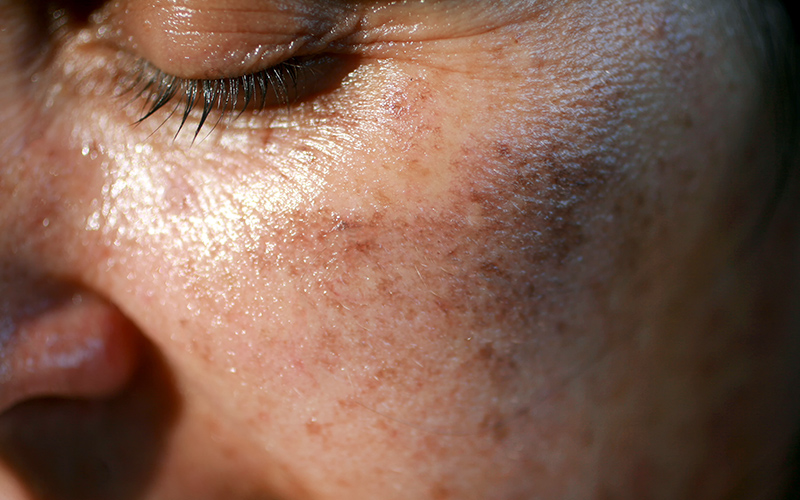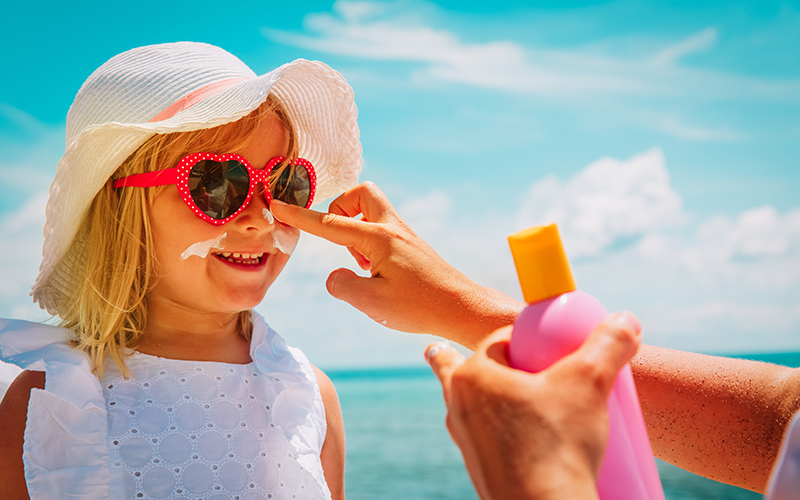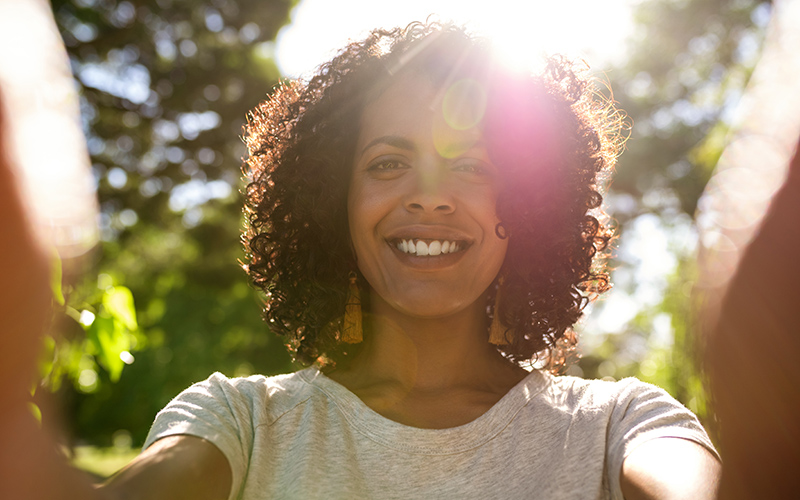Several UV radiation effects can harm human health. This is why it’s so important to take measures to protect yourself from the sun. What are the dangers of UV radiation and how can you protect yourself? Let’s find out.
What Is Ultraviolet (UV) Radiation?
UV radiation is a radiation that does not ionize. The main source of UV radiation is from the sun, but it also comes from man-made sources such as tanning beds, fluorescent lighting, and some types of lasers.
Which Type of UV Radiation Is Most Harmful?
Three types of UV radiation differ in wavelength: UVA, UVB, and UVC. Nearly all the radiation that arrives on the surface of the earth is UVA, but only 5% of UV radiation comes from UVB.
Both UVA and UVB can impact human health, but UVA rays penetrate the skin deeper and can cause premature aging. They are also more constant year-round. On the other hand, UVB rays damage the outermost part of the skin and cause sunburn.
The most harmful type of UV radiation is short-wavelength UVC. Thankfully, UVC is completely filtered out by the ozone layer and atmosphere. Hence, the danger of UV radiation mostly comes from UVA and UVB, and we will focus on protecting ourselves from those two types.
What Are the Harmful Effects of UV Radiation on Humans?
There are 5 harmful effects of UV radiation on humans.
1. Skin Cancer
One of the most harmful effects of UV rays on humans is skin cancer. Around 20% of Americans will develop it throughout their life. Moreover, one in five Americans die from it each hour.
The most dangerous type of skin cancer is melanoma. It’s a common cancer among young adults and teens aged 15-29. Melanoma accounts for 3% of skin cancer causes. Despite this, it causes over 75% of deaths related to skin cancer. Risk factors include UV exposure and sunburns, especially during childhood. Melanomas are also influenced by immune system issues and genetic factors.
Other types of skin cancers are not as deadly, but they can spread if untreated. They can cause serious health issues and disfigurement. The two primary types include basal and squamous cell carcinomas. They are not as fatal when caught and treated early.
2. Skin Damage

Ultraviolet skin damage can come in the form of actinic keratoses. These are skin growths that appear on exposed skin. Usually, they appear on the face, forearms, hands, and the “V” of the neck. They are usually premalignant but also a risk factor for squamous cell carcinoma. Actinic keratoses look generally reddish and raised and have rough skin growths.
In addition, sometimes, overexposure to the sun in the short term can lead to sunburn. This can be very painful and can lead to other health complications in the long term. It can even increase the risk of skin cancer.
3. Premature Aging
The effects of UV rays on the skin can also include premature aging. Over time, the skin can become leathery, wrinkled, and thick. It usually occurs gradually after many years of exposure to the sun. Moreover, it is typically unavoidable and is part of aging.
However, almost 90% of visible changes from aging are caused by sun exposure. Hence, you can reduce the effects of premature aging by protecting your skin.
4. Eye Damage and Cataracts

The danger of ultraviolet rays also includes cataracts and eye damage. When untreated, cataracts lead to cloudy vision and even blindness. They may be cured through eye surgeries, but they can cost a lot in annual medical care.
Other forms of eye damage include skin cancer around the eyes, macula degeneration, and pterygium. People can lessen the effects of UV radiation by wearing proper eye protection.
5. Immune System Suppression
One of the lesser-known risks of UV radiation is suppressing the body’s immune system and the skin’s defenses. The skin can protect you against foreign invaders like infections and cancers. However, overexposure to UV radiation might reduce the strength of your immune system.
Who Is Most At Risk?
UV radiation does not affect everyone equally. In fact, certain groups of people are more at risk of getting these complications. UV rays may have a more pronounced effect on people who:
- Are in their childhood or adolescent years
- Have been sunburned, especially during childhood
- Spend a lot of time in the sun
- Have a high number of moles on the body
- Take topical and oral medicines like benzoyl peroxide products, birth control pills, antibiotics, and certain cosmetics
- Have a family history of skin cancer
- Are over 50 years of age
- Have light-colored eyes, hair, and skin
How to Protect Yourself From UV Radiation Effects

The effects of UV radiation on the skin can be dire for many people, but they are also preventable. Here are some practical ways to protect yourself from UV radiation.
- Find Shade. When going out or engaging in outdoor summer activities, stay in the shade as much as possible. This is especially important during midday hours.
- Cover Up. Wear clothes that cover more of your legs and arms. Try to limit skin exposure.
- Wear Sunglasses. Wear sunglasses that filter both UVB and UVA rays.
- Wear Sunscreen. Wearing sunscreen is one of the simplest ways to protect your skin. Make sure to wear sunscreen with at least SPF 15 that protects you from both UVA and UVB.
- Wear Broad Brimmed Hats. Hats can protect your ears, eyes, neck, and face from the sun. Consider wearing hats when you go outside.
- Avoid Tanning. Although tanning beds have been popular for decades, indoor tanning is particularly dangerous for those in early adulthood and adolescence. They are at an increased risk of developing melanoma.
- Stay Indoors. While there are various forms of sun protection, it’s usually best to stay indoors when possible. Sunscreen may be helpful, but it should not be used to extend the time you spend in the sun.
Stay Protected
Protecting yourself from UV radiation effects is crucial in preventing complications like cataracts and melanoma. While sun protection is not foolproof, it’s always a good idea to take careful steps to protect yourself from the sun.
You Can Also Read These:
- 9 Common Spring Diseases And How To Prevent Them
- How To Update Your Spring Wardrobe
- 9 Ways To Achieve Stress-Free Spring

